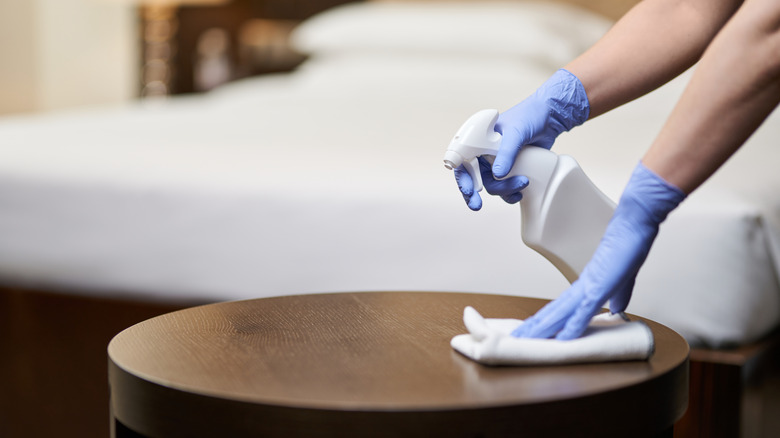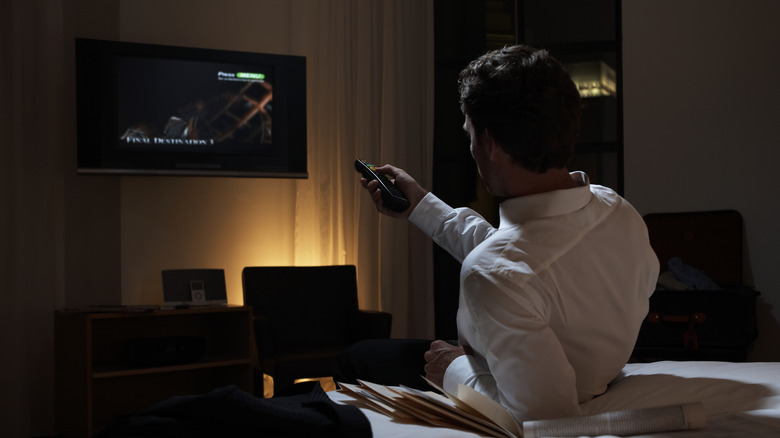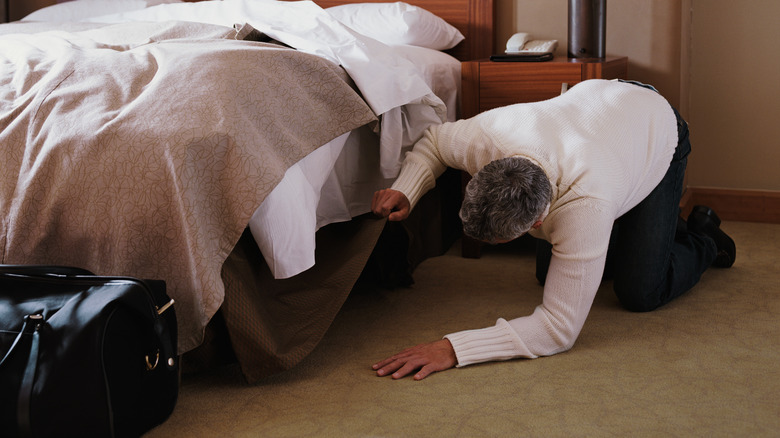The Grossest Spots In Hotel Rooms You Shouldn't Be Touching, According To Hotel Inspectors
The sheets are bright white, the pillows feel brand new, and everything smells slightly of disinfectant — but is your hotel room actually clean? Unfortunately, you may want to pack some alcohol wipes. According to one inspector for AAA in a report from the Washington Post, there are some problem spots like light switches, TV remotes, coffee makers, carpets, and throw pillows that you probably should avoid touching.
Hotel maids are expected to clean a lot of rooms during their shifts (and guests using the 'Do Not Disturb' sign can make a housekeeper's job harder) so it's not surprising that some areas get missed. Unfortunately, sometimes the same areas don't get enough cleaning over and over again. To determine if hotels are clean, inspectors and researchers test for bacteria growing on surfaces. It's worth noting that not all bacteria can make you sick, so just because something is growing a lot of bacteria doesn't necessarily mean you'll find yourself throwing up after using it.
However, research published in Scientific American found that 81% of surfaces in hotel rooms were contaminated by fecal bacteria, and a study from TravelMath found bacteria that cause various ailments, from stomach issues to skin infections, living in hotel rooms. Regardless of how dangerous the particular bacteria is, an inspector finding a large amount of bacteria growing in a particular area of the hotel room indicates that it's not getting cleaned enough, which is pretty gross.
Things everyone touches but not everybody cleans
You might have heard that you should rethink indulging in hotel breakfasts for sanitation reasons, but there are unexpectedly dirty areas in hotel rooms that don't get the cleaning they need, too. Some of the areas that most hotel guests touch are not necessarily on the radar of hotel maids, which means that if the hotel guest before you happened to skip washing their hands after using the bathroom, those germs could end up on your hands, too. An AAA inspector told the Washington Post: "When we first started swabbing, the remote control was the germiest, but now it is not as much. It's usually the light switch at the front door that tends to fail the most for me."
These observations are backed up by research reported by Time, which found that both TV remotes and light switches very often had high levels of bacteria growing on them. The rest of your bedside table isn't necessarily safe either, as a 2012 study from the American Society of Microbiology found both the switch to turn on the bedside lamp to be very frequently contaminated, and a 2014 Rossen Reports investigation (via Today) found hotel room phones to be extremely dirty, too.
Carpets and fabrics that aren't your sheets
You've probably heard you should avoid using the luggage rack in your hotel room and any upholstered surfaces if you're suspicious of bed bugs, but even if there's not a bed bug in sight, microscopic "bugs," aka bacteria, may be lurking in your room's soft surfaces. Hotel sheets are regularly washed and treated with stain removers to keep them looking crisp and brand new, but other soft surfaces in your hotel room might not be getting that same treatment. Things like duvets do not always get that same treatment. Other comfy furniture is also unlikely to get regular cleanings. An AAA inspector told the Washington Post that she particularly mistrusts sleeper sofas in hotel rooms and would never use a decorative throw pillow, describing them as "super germy."
The inspector also stated that you should always bring an easy slip-on slipper for wearing around your hotel room. While some people always wear flip flops in the hotel shower, the carpets may be a bigger risk. Like other soft surfaces in the room, it can hold a lot of grime. One researcher from the University of Houston's hotel school told a reporter from KUHF Health Science and Technology that the patch of carpet right in front of the hotel room door is the dirtiest area, because people track dirt in on their shoes. While the carpets are regularly vacuumed by hotel staff, that's still not enough to get such a filthy area clean.


